
The Australian Kelpie, or simply Kelpie, is an Australian sheepdog capable of mustering and droving with little or no guidance. It is a medium-sized dog and comes in a variety of colours. The Kelpie has been exported throughout the world and is used to muster livestock, primarily sheep, cattle and goats.

The Border Collie is a British breed of herding dog of the collie type of medium size. It originates in the region of the Anglo-Scottish border, and descends from the traditional sheepdogs once found all over the British Isles. It is kept mostly as a working sheep-herding dog or as a companion animal. It competes with success in sheepdog trials. It has been claimed that it is the most intelligent breed of dog.

Schutzhund, currently known competitively as IGP and previously as IPO, is a dog sport that tests a dog's tracking, obedience, and protection skills, and evaluates if a dog has the appropriate traits and characteristics of a good working dog. It was developed in Germany in the early 1900s as a suitability test for German Shepherds, but soon became the model for training and evaluating all five of the German protection breeds, which included Boxer, Dobermann, Giant Schnauzer, and Rottweiler. Though any breed of dog can participate, today the sport is dominated by German Shepherds and the Belgian Shepherd breed. Dog owners and handlers participate in Schutzhund clubs as a group activity for training the dogs, and clubs sponsor trials to test the dogs and award titles. The best dogs can qualify to participate in national and international level championships.
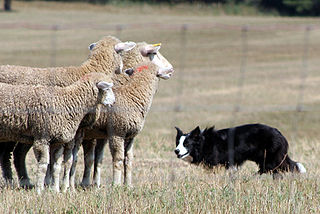
A sheepdog trial – also herding event, stock dog trial or simply dog trial — is a competition or test of the working abilities of dogs of herding breeds. It is a type of dog sport that emerged in the 1860s in New Zealand. By the 1870s regular trials were also being held in Australia and in the United Kingdom, and by the end of the twentieth century the sport had spread to many countries of the world. In competition, dogs demonstrate basic herding management skills assessed by the judge. These events are organised by international and national cynological and sports organisations and by associations of sheep- and cattle-breeders. Usually sheep are to be herded; other animals including ducks or cows may also be used.

A working dog is a dog used to perform practical tasks, as opposed to pet or companion dogs.

A herding dog, also known as a stock dog or working dog, is a type of dog that either has been trained in herding livestock or belongs to one of the breeds that were developed for herding. A dog specifically trained to herd sheep is known as a sheep dog or shepherd dog.
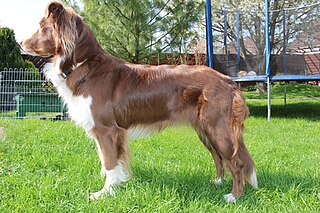
The Australian Shepherd is a breed of herding dog from the United States. The name of the breed is technically a misnomer, as it was developed in California in the 19th century. It is believed to have its origins in sheepdog breeds from northwest Spain, as well as collies imported, alongside sheep, from Australia and New Zealand; the breed reportedly took its name from this trade. Originally used solely as a herding dog, the Australian Shepherd has become one of the most popular companion dog breeds in North America.

The Puli is a small-medium breed of Hungarian herding dog known for its long, corded coat. The tight curls of the coat appear similar to dreadlocks. A similar-looking, but much larger breed – also Hungarian – is the Komondor.

The Koolie is an Australian dog breed. The Koolie is a working or herding dog which has existed in Australia since the early 19th century when it was bred from imported British working dogs. Robert Kaleski, in an article on Cattle Dogs in the August 1903 issue of the Agricultural Gazette of New South Wales, describes the "Welsh heeler or merle, erroneously known as the German collie," as a "blue-gray dog about the size and build of a smooth-haired collie, generally with wall eyes." The British background predominated in the dogs that came to be associated with the "German collie" name.

The McNab Dog, also called the McNab Shepherd or McNab Collie is a herding dog that originated in Hopland, Mendocino County, Northern California. The McNab was bred to withstand the tough conditions found in California such as heat, burrs, foxtails, and rugged terrain. Until recently, the McNab was little known outside California, but in last three decades have seen a gain in popularity and geographic dispersal of the breed.

The Norwegian Buhund is a breed of dog of the spitz type. It is closely related to the Icelandic Sheepdog and the Jämthund. The Buhund is used as a watch dog and an all purpose farm and herding dog.
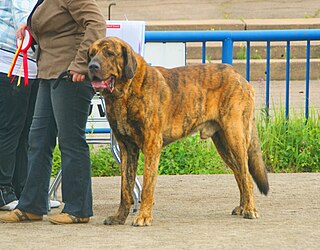
The Spanish Mastiff or Mastín Español is a breed of dog from Spain, originally bred to be a guard dog and whose specialized purpose is to be a livestock guardian dog protecting flocks and/or herds from wolves and other predators.

The Dutch Shepherd is a herding dog of Dutch origin. They were used by shepherds and farmers who needed a versatile dog, with few demands, and a dog that was able to adapt to a harsh and meager existence.

The Central Asian Shepherd Dog, also known as the Alabay, Alabai and Turkmen Wolf-Hound, is a livestock guardian dog breed. Traditionally, the breed was used for guarding sheep and goat herds, as well as to protect and for guard duty. In 1990, the State Agroindustrial Committee of Turkmenistan approved the standard of the Turkmen Wolf-Hound dog breed.

The Bohemian Shepherd is an ancient sheep herding dog and watch dog originating from what is today the Czech Republic. Since 2019, the Bohemian Shepherd has been provisionally recognized by the FCI and the AKC's Foundation Stock Service.
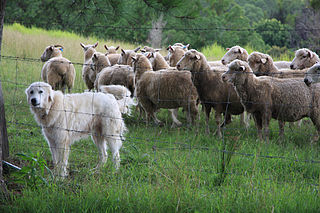
A livestock guardian dog (LGD) is a dog type bred for the purpose of protecting livestock from predators.
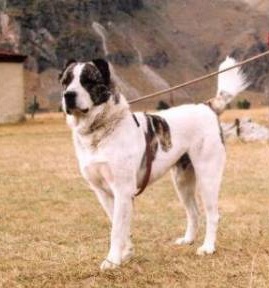
The Georgian Shepherd, also known as Georgian Mountain Dog, is a breed of guard dog and livestock guardian dog from the Georgian Caucasus.
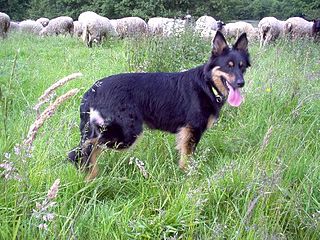
Old German herding dogs, including old German sheep dogs or old German shepherd dogs are a group of traditional types of working, herding dogs from Germany. They are landraces consisting of working strains of dog, and some of them are the types from which the modern German Shepherd Dog was developed as a standardised breed. The landraces are not recognised by the Fédération Cynologique Internationale, but some have their own standards which are for working ability, not appearance traits.
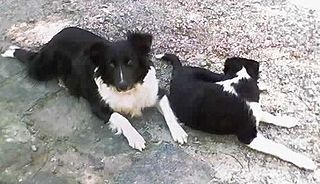
The Gaucho Sheepdog (Portuguese: Ovelheiro gaúcho) is a dog breed that originated in the Pampas, Brazil. The breed is not recognized by the Fédération Cynologique Internationale (FCI), but it has been recognized by the CBKC, a Brazilian kennel club affiliated with FCI. Dogs of this breed are often characterized as sturdy and agile, which makes them suitable for herding activities. The Gaucho sheepdog is widely used for herding sheep and other livestock, especially in the southern region of Brazil.


















